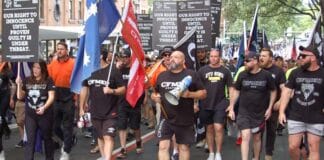Anger and resentment is running high among workers at Brisbane’s Treasury Casino. Eight months of bargaining and two cancelled strikes have left us with a sub-standard agreement. The Casino bosses’ final offer of 2.5, 3, 3, and 4 per cent over three-and-a-half years was no improvement on the first rejected offer of 3.5 per cent for three years. But it could have been so different.
In the lead up to the enterprise bargaining negotiations, activists built union numbers from around 250 to 605, the highest ever Casino numbers. Dealers, security, stewards, engineers and cleaners had over 80 per cent union membership.
On April 14 a mass meeting of the Casino’s Liquor, Hospitality and Miscellaneous Union members voted unanimously to strike. Just one month later, 99 per cent of union members who returned postal ballots again voted to strike. “I had been waiting for strike action for 14 years,” one Casino worker told Solidarity.
Militant sections of the membership demanded a 24-hour strike during peak business hours to hit the company hard. However, union leaders were unwilling, and only gave notice for a four-hour stoppage on June 12.
When the Casino’s lawyers challenged the strike over a legal technicality, the union cancelled it.
Angry LHMU members demanded that the union up the ante and give notice for a 24-hour strike for the following Friday. But, a few days before the strike the union officials persuaded the delegate’s committee to drop the wage demand from 5.5 to around 3.5 per cent. The union back down only encouraged the Casino to offer even less. Astonishingly, the union cancelled the second planned strike and agreed to go ahead with a company-controlled ballot on the offer.
The LHMU officials declared themselves “neutral”. But many workers were disgusted to see the leading Casinos’ organiser, Don Brown, at the company’s information session, standing beside the Casino’s Managing Director Geoff Hogg (known as “Boss Hogg” after the sweaty sheriff on Dukes of Hazzard) effectively pushing a “yes” vote. Don Brown even had a power point presentation showing why Casino workers shouldn’t strike!
This time a substantial number of unionised workers felt they had lost the support of their union and didn’t cast a ballot. The company’s offer got up with just 50.8 per cent of the vote. There were angry scenes a few days later with some workers abusing the officials as “gutless” and “sell-outs”. “We could have taken strike action,” said one worker, “It was obvious we had the numbers, but the union didn’t want to back us.”
But all the good grass roots work to build our collective strength has been hit by the unwillingness of union officials to back strike action to win the full demand for 5.5 per cent.
Around 100 members have resigned from the LHMU in protest at the officials back down. Bizarrely, the union officials have tried to blame the resignations on the rank-and-file-produced newsletter, The Real Deal, and on activists who are critical of their handling of the campaign. “I’m coming after you,” organiser Don Brown told one Real Deal supporter.
The task now is to stop any further decline and rebuild the strength we had just a few weeks ago. The Casino bosses will be confident after they won the ballot. If they get the chance the bullying that has been common in the past will continue.
The upcoming delegate elections are a chance to organise and rebuild our confidence to stand up to the bosses on a day-to-day basis.
By a Casino delegate





